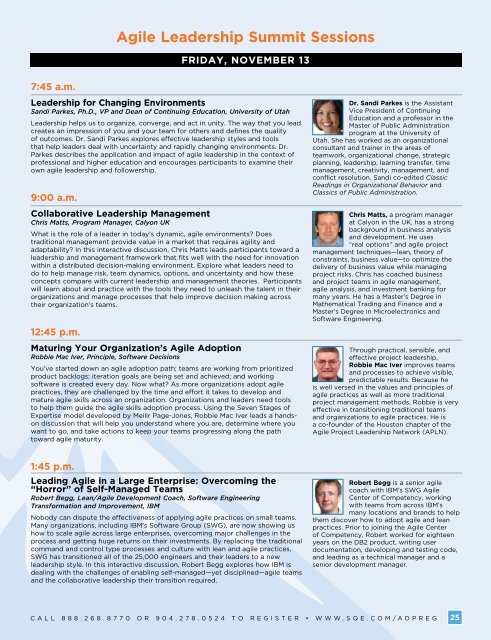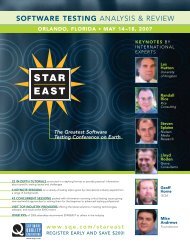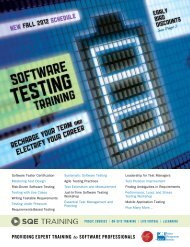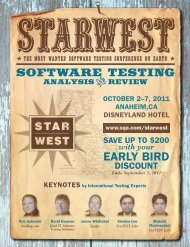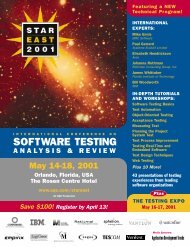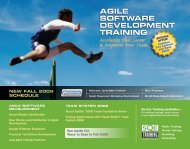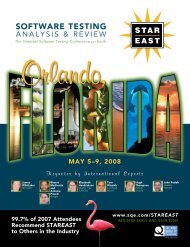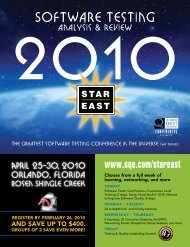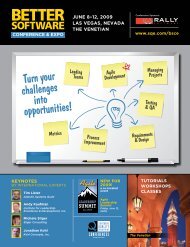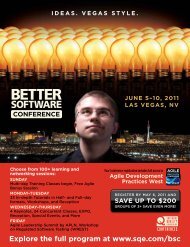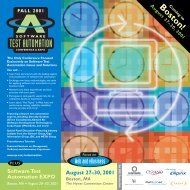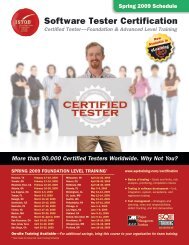Agile Development Practices Conference - SQE.com
Agile Development Practices Conference - SQE.com
Agile Development Practices Conference - SQE.com
Create successful ePaper yourself
Turn your PDF publications into a flip-book with our unique Google optimized e-Paper software.
<strong>Agile</strong> Leadership Summit Sessionsfriday, november 137:45 a.m.Leadership for Changing EnvironmentsSandi Parkes, Ph.D., VP and Dean of Continuing Education, University of UtahLeadership helps us to organize, converge, and act in unity. The way that you leadcreates an impression of you and your team for others and defines the qualityof out<strong>com</strong>es. Dr. Sandi Parkes explores effective leadership styles and toolsthat help leaders deal with uncertainty and rapidly changing environments. Dr.Parkes describes the application and impact of agile leadership in the context ofprofessional and higher education and encourages participants to examine theirown agile leadership and followership.9:00 a.m.Collaborative Leadership ManagementChris Matts, Program Manager, Calyon UKWhat is the role of a leader in today’s dynamic, agile environments? Doestraditional management provide value in a market that requires agility andadaptability? In this interactive discussion, Chris Matts leads participants toward aleadership and management framework that fits well with the need for innovationwithin a distributed decision-making environment. Explore what leaders need todo to help manage risk, team dynamics, options, and uncertainty and how theseconcepts <strong>com</strong>pare with current leadership and management theories. Participantswill learn about and practice with the tools they need to unleash the talent in theirorganizations and manage processes that help improve decision making acrosstheir organization’s teams.12:45 p.m.Maturing Your Organization’s <strong>Agile</strong> AdoptionRobbie Mac Iver, Principle, Software DecisionsYou’ve started down an agile adoption path; teams are working from prioritizedproduct backlogs; iteration goals are being set and achieved; and workingsoftware is created every day. Now what? As more organizations adopt agilepractices, they are challenged by the time and effort it takes to develop andmature agile skills across an organization. Organizations and leaders need toolsto help them guide the agile skills adoption process. Using the Seven Stages ofExpertise model developed by Meilir Page-Jones, Robbie Mac Iver leads a handsondiscussion that will help you understand where you are, determine where youwant to go, and take actions to keep your teams progressing along the pathtoward agile maturity.Dr. Sandi Parkes is the AssistantVice President of ContinuingEducation and a professor in theMaster of Public Administrationprogram at the University ofUtah. She has worked as an organizationalconsultant and trainer in the areas ofteamwork, organizational change, strategicplanning, leadership, learning transfer, timemanagement, creativity, management, andconflict resolution. Sandi co-edited ClassicReadings in Organizational Behavior andClassics of Public Administration.Chris Matts, a program managerat Calyon in the UK, has a strongbackground in business analysisand development. He uses“real options” and agile projectmanagement techniques—lean, theory ofconstraints, business value—to optimize thedelivery of business value while managingproject risks. Chris has coached businessand project teams in agile management,agile analysis, and investment banking formany years. He has a Master’s Degree inMathematical Trading and Finance and aMaster’s Degree in Microelectronics andSoftware Engineering.Through practical, sensible, andeffective project leadership,Robbie Mac Iver improves teamsand processes to achieve visible,predictable results. Because heis well versed in the values and principles ofagile practices as well as more traditionalproject management methods, Robbie is veryeffective in transitioning traditional teamsand organizations to agile practices. He isa co-founder of the Houston chapter of the<strong>Agile</strong> Project Leadership Network (APLN).1:45 p.m.Leading <strong>Agile</strong> in a Large Enterprise: Over<strong>com</strong>ing the“Horror” of Self-Managed TeamsRobert Begg, Lean/<strong>Agile</strong> <strong>Development</strong> Coach, Software EngineeringTransformation and Improvement, IBMNobody can dispute the effectiveness of applying agile practices on small teams.Many organizations, including IBM’s Software Group (SWG), are now showing ushow to scale agile across large enterprises, over<strong>com</strong>ing major challenges in theprocess and getting huge returns on their investments. By replacing the traditional<strong>com</strong>mand and control type processes and culture with lean and agile practices,SWG has transitioned all of the 25,000 engineers and their leaders to a newleadership style. In this interactive discussion, Robert Begg explores how IBM isdealing with the challenges of enabling self-managed—yet disciplined—agile teamsand the collaborative leadership their transition required.Robert Begg is a senior agilecoach with IBM’s SWG <strong>Agile</strong>Center of Competency, workingwith teams from across IBM’smany locations and brands to helpthem discover how to adopt agile and leanpractices. Prior to joining the <strong>Agile</strong> Centerof Competency, Robert worked for eighteenyears on the DB2 product, writing userdocumentation, developing and testing code,and leading as a technical manager and asenior development manager.Call 888.268.8770 or 904.278.0524 to register • WWW.<strong>SQE</strong>.COM/ADPREG 25


